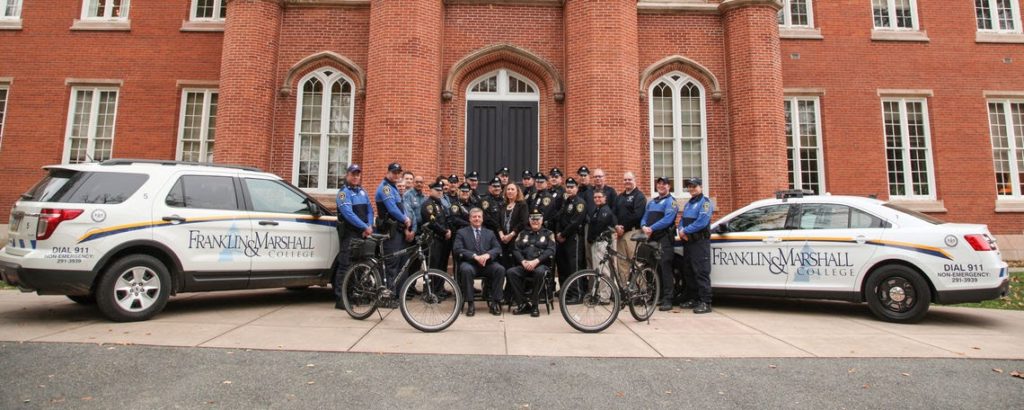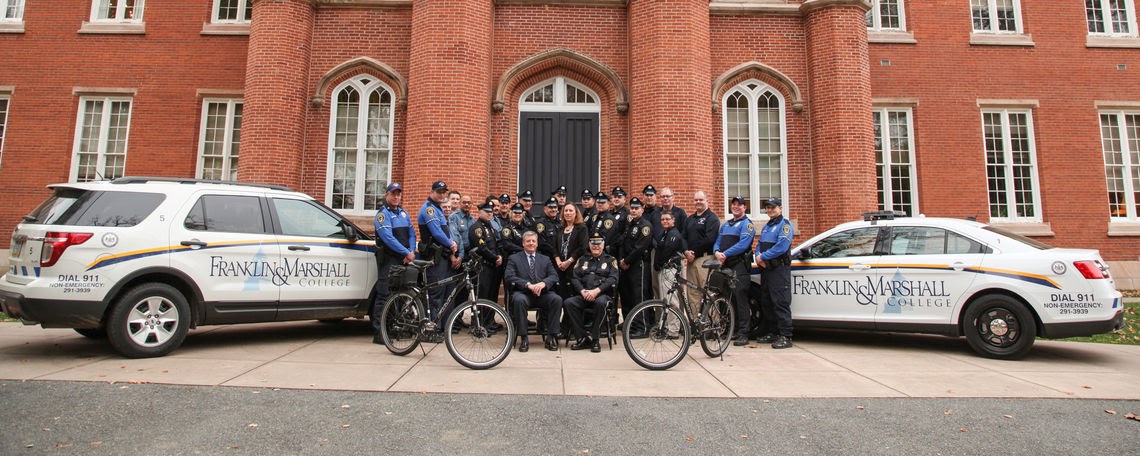By Ellyn Fritz || News Editor & Sarah Nicell || Layout Assistant

The Department of Public Safety, commonly referred to as P-Safe or DPS at Franklin & Marshall College, often finds itself the subject of significant conversation on campus. With the department working 24 hours a day and school grounds being heavily de-densified, officers can be spotted fairly easily during a brief walk to Blue Line Café and back. In the midst of international protests regarding police brutality, student-officer relations are as strained as ever, and it is certainly an issue that tensions may prevent the comfort and safety that Public Safety is intended to offer students. To truly understand this relationship and how DPS has evolved over time, it is important to reflect on its history.
As of 1997, the Department of Public Safety (DPS) was not recognizable as the same organization that exists today on F&M’s campus. DPS was not a police force, and the department functioned solely as security for the school; therefore, Franklin & Marshall’s campus relied on Lancaster city police and the Manheim Township police department as their source of authority.
The biggest transition for the Department of Public Safety at Franklin & Marshall was when John Fry became president of the college. Fry sought to revamp and professionalize the Department of Public Safety. During Fry’s time as president, DPS’s involvement and credentials drastically changed. In 2003, John Fry hired Maureen Kelly as the director of public safety to spearhead DPS’s acquisition of Title 22. In Pennsylvania, Title 22 (Detective and Private Police Act) is the act providing private police such as F&M’s DPS most of its power and authority. Under Title 22, there is no requirement to receive Act 120: a title requiring basic training for all municipal police officers in the Commonwealth of PA. However, Franklin & Marshall will not employ an officer who has not yet obtained or is not current in their ACT 120 training.
Title 22 differs from Title 53 (Municipalities), which is the act where municipal police derive their powers and authority. This applies to departments such as the Lancaster Bureau of Police, Manheim Township PD, and all other municipal police departments. A private police department such as DPS is funded by the entity they serve, which is Franklin & Marshall in the case of DPS, while police departments under Title 53 are funded by their municipalities.
Before DPS’ transition to serving under Title 22, surrounding police departments, including Lancaster and Manheim Township, had the authority to come onto campus when something had happened, and students’ 911 calls were answered by either police department’s dispatch. Today, DPS has jurisdiction over all land and property owned by the college and in most situations, surrounding police departments will defer 911 calls that pertain to F&M property to Public Safety.
Title 22 has decreased the time it takes for an officer to respond to an F&M student call and has allowed the disciplinary process to be educational rather than punitive. Before DPS started acting under Title 22, students would receive citations for infractions that would result in court dates and fines; however, student conduct is now handled by the school as DPS refers reports to the college. However, DPS still maintains a relationship with Lancaster PD as there is an understanding that F&M will report certain statistics to Lancaster PD. In most circumstances, situations will be handled by the school. Serious crime, however, is reported to the city, and all cases of sexual assault are handled by the city.
Due to the transition from legal consequences following P-Safe interference to educational repercussions, students no longer face the fear of court dates. However, a different type of fear arises when undergraduates see the infamous police uniform, a distressing experience especially for BIPOC students who have watched police brutality and endless protests develop globally. It is critical too to consider the reports of discomfort that many continue to feel around Public Safety, regardless of how the department evolves.
When talking with Chief McHale, he shared his perspective that “students come to our campus with preconceived feelings about law enforcement based on their feelings from where they come from back home. Additionally, the national climate has not been receptive to law enforcement, and although DPS wouldn’t act in the ways officers have been shown to, [DPS] is still viewed as law enforcement.”
“I think students realize when P-Safe is involved… there is going to be a reaction,” Anne Strickler, the Crime Analyst and Compliance Officer for Public Safety commented.
In an effort to alleviate these tensions, Roschel College House attempted to organize an event that would ultimately allow students to begin a friendly relationship with the officers they see on campus every day. Sergeant McAllister, Roschel’s House Liaison, proposed a “Donut Event” in which out-of-uniform officers would give out the treats to students, providing an opportunity for young people to see P-Safe as a department of human beings rather than authority figures with a badge.
Navjit Kaur, the Consul of the Roschel College House Senate, explained, “By having small, casual events such as this Donut event, students will be able to form some sort of connection with PSafe. The goal is that by fostering connections and being proactive, students will feel safe and comfortable when PSafe is needed in serious situations rather than feeling anxious and scared.”
Nav conceded that according to student accounts, P-Safe has caused harm and discomfort, and she in no way intends to invalidate their experiences; however, the Consul feels that the best way to ensure campus safety for all is to improve student-officer relations. This event, Public Safety and Navjit agree, would be a step in the right direction.
On the other hand, Bonchek Congress, Brooks Congress, Ware Parliament, and Weis Assembly of Peers voted against sponsoring the Donut Event. These oppositions arise for a few reasons, including a refusal to spend money on an event that lacks real value in improving student-officer relations and the acknowledgment that this type of function may not be the best place to begin to break the tension.
“We all recognize that there is a problem on campus, revolving around students and our officers, but what we are struggling with now is figuring out the right course of action that will enable all students, from all races and backgrounds, to feel supported and understood,” Anuj Ghimerey, Ware’s Prime Minister, explains on why this prompt was shot down by the Parliament.
Though it seems that the Donut Event is not favored by the majority due to its oversimplification of the issue, both house governments and the department of P-Safe have made themselves open to other methods of improving this strained relationship. Q&As, round table events, and simply providing students the opportunity to ask Public Safety officers questions and to express their concerns in an environment where they will not be judged are all possibilities that have been discussed.
Chief McHale discussed the challenges of making progress in the relationship between DPS and students, “Just when we think we are making headway with students, they graduate so it’s a constant flow of trying to show students that we are not an advisory, we are actually here for you and want to be an ally.”
Chief McHale also explained some of the measures DPS has taken in recent years to break down the barriers between students and public safety officers. When Chief McHale took over Maureen Kelly’s role as Chief in 2012, he instituted community policing. DPS officers used to patrol solely from their vehicles, however, with the institutionalization of community policing, officers began walking around campus, riding bikes, and parking vehicles to increase their presence on campus. Additionally, liaisons were established with every house so that if there was ever an issue at a house, there was a known officer available for information if a situation were to occur. Since the heightened tensions between police officers and civilians from events of police brutality early in summer 2020 and the tumultuous national climate, Chief McHale brought in a private vendor to discuss implicit bias and escalation techniques with DPS. DPS’s uniform has also changed to a more casual look; polos and khakis rather than a traditional police officer uniform. The reasoning behind the change is to increase DPS’s approachability for students on campus.
The pandemic has also stunted potential growth in the relationship between DPS and students. Chief McHale explained how “COVID did hurt us, a lot of events where we are normally able to interact with students have been canceled, football games, basketball games, plays.” Despite the implications of the pandemic and looking forward, McHale said that “all the officers here as a team are committed to this campus. We really truly invest in our students. We care about the students and what they do when they graduate.”
Regardless of how these tensions are eased, it is abundantly clear that students want to feel safe, and P-Safe officers seem (at least in part) willing to take a first step toward fostering a trusting relationship between students and DPS officers.
Junior Ellyn Fritz is the News Editor. Her email is efritz@fandm.edu.
First Year Sarah Nicell is a Layout Assistant. Her email is snicell@fandm.edu.
